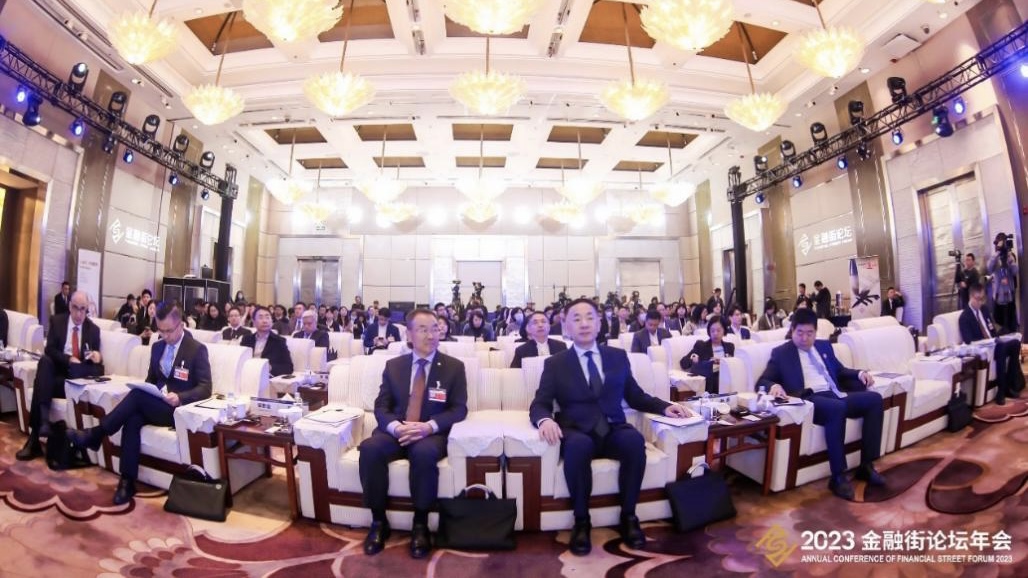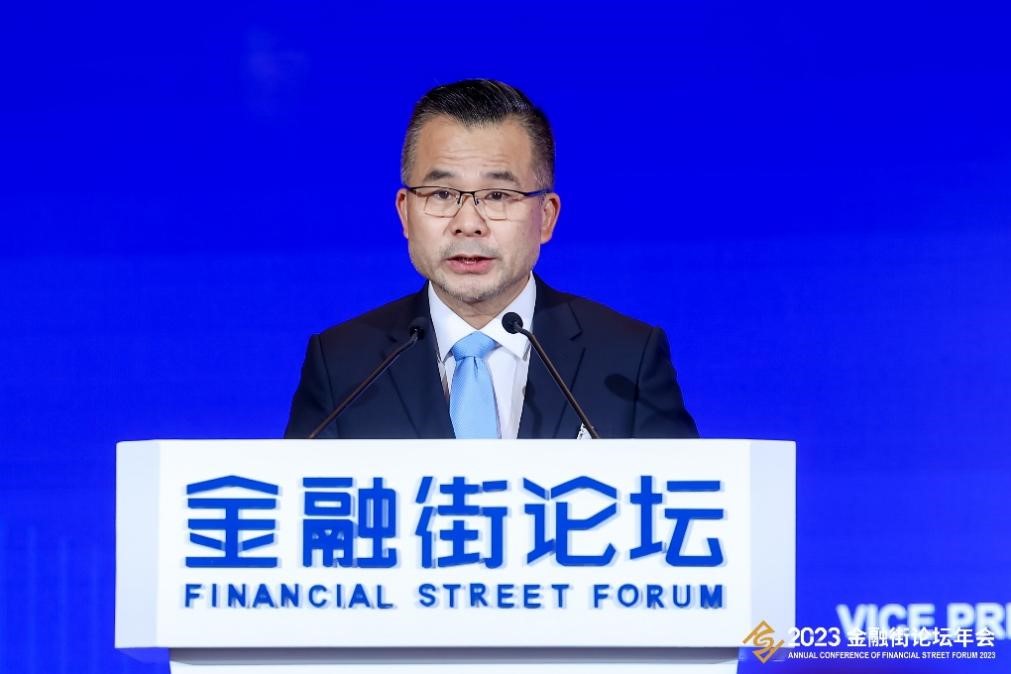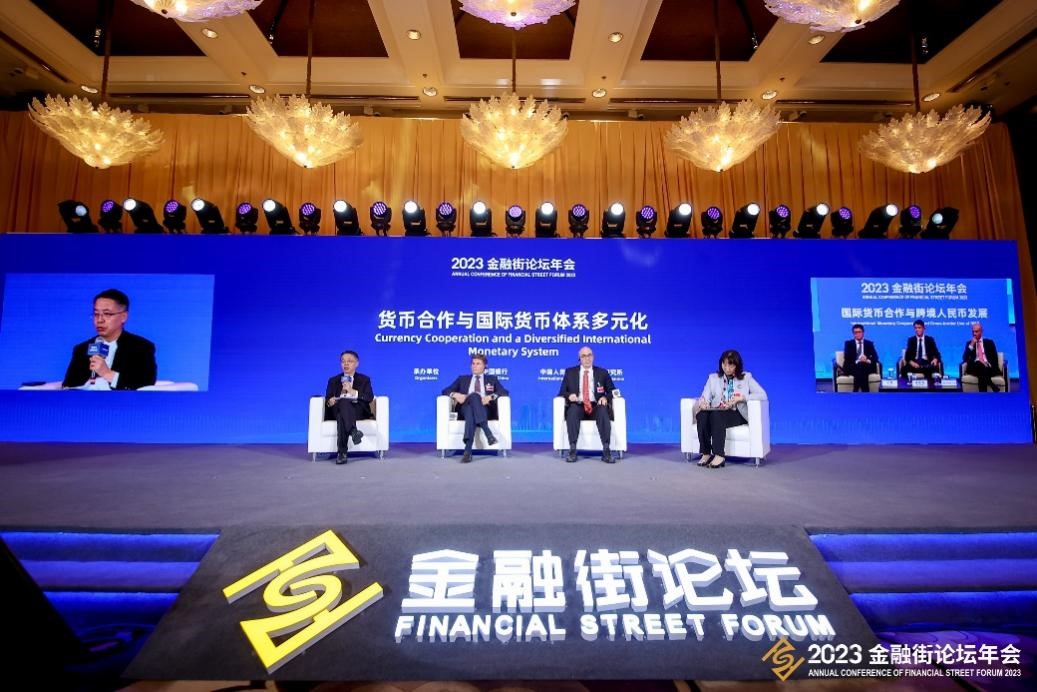Parallel Forum on “Monetary Cooperation and Diversification of International Monetary System” at the Annual Conference of Financial Street Forum 2023
2023-12-01 IMIOn November 9th, the International Monetary Institute (IMI) of Renmin University of China, in collaboration with the Bank of China, jointly hosted the 2023 Financial Street Forum Annual Conference’s parallel forum on “Monetary Cooperation and Diversification of International Monetary System.” During the session on “Evolution and Reform of the International Monetary System,” keynote speeches were delivered on-site by Jin Wei, Deputy Mayor of Beijing, Liu Jin, President of the Bank of China, and Zheng Xinye, Vice President of Renmin University of China. Chen Maobo, Financial Secretary of the Hong Kong Special Administrative Region, delivered a remote video speech. The forum was moderated by Zhang Xiaodong, Deputy President of the Bank of China.

In his speech, Jin Wei stated that Beijing has held the top position globally as a Fin-tech hub for four consecutive years. As the capital’s primary pillar industry, finance provides robust support for high-quality development. In recent years, with strong support and guidance from the central government and relevant ministries, Beijing has actively participated in national financial governance and the RMB internationalization. In the future, Beijing will continue to strengthen its construction as the national financial management center, enhance the multi-level capital market system, promote the development of the Beijing Stock Exchange and advance market reforms, accelerate the construction of the Zhongguancun Sci-Tech Innovation Financial Reform Pilot Zone, encourage financial institutions to introduce more green finance, digital finance, and inclusive finance products, and attract more foreign financial institutions and high-quality projects to establish a presence.
Liu Jin expressed that the current monetary policies of major economies are frequently adjusted, with the global economy exhibiting prominent features of virtualization and financialization, challenging the public goods attributes of major international currencies. At the same time, the cross-border use of RMB is gradually increasing, with improved convenience, playing a positive role in promoting global economic and trade cooperation and, to some extent, enhancing the operational efficiency of the international monetary system. In this regard, Liu Jin summarized three key points: firstly, supplementing international liquidity through the signing of bilateral currency swap agreements to support the development of cross-border trade and investment. Secondly, maintaining the value of RMB, expanding its investment channels, and increasingly highlighting RMB’s international attractiveness. Thirdly, the RMB internationalization can contribute to BRI, promoting inclusive global development.
Chen Maobo believes that Hong Kong, as an international financial center, possesses ample buffer space and strong resilience, playing a crucial role in global offshore RMB business. He also stated that through the mutual connectivity initiative, Hong Kong aims to introduce more risk management tools and enhance market liquidity. Hong Kong is actively promoting RMB internationalization, attracting more foreign companies to list in Hong Kong to draw in additional international funds. In the future, Hong Kong will continue to serve as a testing ground and a firewall, playing a bridging role between the mainland and overseas, contributing to the high-quality development of the country.
Zheng Xinye stated that the current world economy is in a highly uncertain era, where the fluctuations in the global economy not only impact the daily lives of individuals but also undermine the potential for long-term economic growth. In the short term, influenced by factors such as the COVID-19 pandemic, geopolitical tensions, and inflation, the instability of the world economy has significantly increased. Simultaneously, global economic growth has reached new lows, and inflation has reached new highs, posing a growth challenge to the world economy due to the compounding effects of various factors. As a developing major country facing the severe situation of global economic development, China should emphasize the importance of global policy coordination, attempt to lead the construction of efficient and sustainable multilateral governance mechanisms, establish a fair and just international cooperation platform, strengthen policy interactions among countries, enrich global policy reserves, and promote coordinated global development.

The roundtable discussion on “International Monetary Cooperation and Cross-Border RMB Development” was moderated by Ben Shenglin, Co-Director, International Monetary Institute of Renmin University of China and Dean of the International Business School at Zhejiang University. Participants in the discussion included Xu Huaizhi, Assistant Chief Executive of the Hong Kong Monetary Authority; Ou Guansheng, Chief Executive Officer of Hong Kong Exchanges and Clearing Limited; Sun Yu, Chief Executive, Bank of China Hong Kong; Steven Barnett, Senior Resident Representative of IMF in China; Javier Pérez-Tasso, Global Chief Executive Officer of the Society for Worldwide Interbank Financial Telecommunication (SWIFT); and Wang Fang, Deputy Dean of the School of Finance at Renmin University of China and Deputy Director of the International Monetary Institute. The discussion focused on topics such as the direction of reform in the international monetary system, the significance of RMB internationalization, the crucial role of Hong Kong as an offshore RMB center, and the important role of commercial banks in the process of RMB internationalization.

Translated by Dong Hanyu
